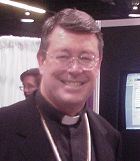 Transcript
of Bishop Edward Clark Chat Session, February 15, 2002
Transcript
of Bishop Edward Clark Chat Session, February 15, 2002
This year, Los Angeles Auxiliary Bishop Edward Clark conducted an online session live from the main Exhibit Hall at the Religious Education Congress. The chat was originally scheduled with Cardinal Roger Mahony, who had become unavailable for the morning. Moderated live from the floor of the Anaheim (Calif.) Convention Center, Bishop Clark will discuss today's challenges facing the U.S. Catholic Church as we move forward into the third millennium.
Over 50 online visitors participated in the
Chat session sponsored by CatholicWeb.com. Visitors posted questions on a
range of topics including the Diocese, the Church’s role on the Internet,
and common challenges facing today's Catholic Church.
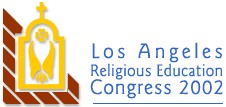
![]()
[ Sponsored by CatholicWeb.com
]
Partial
Transcript of Live Chat Session with Bishop Edward Clark with the Archdiocese
of Los Angeles while attending the Religious Education Conference in Anaheim,
CA
February
15th, 10:30 am to 11:30 am PST
Moderator:
For the past six years it has been a tradition to
conduct an online chat session live from the main exhibit hall at the Los
Angeles Religious Education Congress. This year, we welcome Los Angeles
Auxiliary Bishop Edward M. Clark to our chat.
Moderator:
Bishop Edward Clark was born and raised in
Minneapolis, Minn., but attended local schools in Los Angeles and graduated
from St. John’s Seminary. He was ordained in 1972 by Cardinal Timothy
Manning and much of his priesthood was spent in education, as teacher,
principal and coordinator of secondary schools. In 1988 he received his
doctorate in Sacred Theology and was named rector of St. John’s Seminary in
1994. Cardinal Mahony ordained him a bishop for Our Lady of the Angels Region
in 2001.
Bishop
Clark: Good morning! This is Bishop
Edward Clark at the Religious Education Congress in Anaheim, California. I am
available for chatting for the next hour.
Moderator:
We welcome Bishop Clark and all who are signed on to this chat about issues
facing the Los Angeles Archdiocese and the Catholic Church as a whole.
Bishop
Clark: Good morning!
Moderator:
Bishop Clark would you like to say a few words
before any questions?
Bishop
Clark: I am happy to answer any questions that people have. The Cardinal could
not be here this morning because of a funeral for a family member that was
scheduled for today. I am happy to fill in for him.
Moderator:
Thank you for being here. And welcome to all of
our chat room guests. If anyone has a question please feel free to send it on.
Bishop
Clark: The Religious Education Congress here in Anaheim opened yesterday with
13,000 young people. It was an exciting day with lots of enthusiasm. The
three-day Congress for religious educators opened at 8:00 this morning and
thousands of people have already arrived for the first sessions. The arena was
filled nearly to capacity for the opening prayer gathering.
Moderator:
Carla Michael of Lancaster, CA wrote in with this
question: As a former Protestant, I listened to Christian radio stations. Why
don't we have a Catholic radio station in LA?
Bishop
Clark: Carla, thank you for your question. Across the United States there are
some Catholic radio stations, but they are small and local. In the past it was
attempted to have a major, nationwide station but it did not prove successful.
Though there are some television and radio programs that are picked up in a
number of areas across the United States.
Charlie:
Bishop Clarke what do you think of the Catholic Church's roll on the web?
Bishop
Clark: This is a relatively new enterprise for the Church, but many dioceses and
other Catholic organizations have developed very good web sites for
communicating with people all across the country. There are numerous chat
rooms for Catholic participation.
Our
Archdiocesan web site has just undergone revision. In addition, we now use the
Internet for communicating with our parishes, schools, organizations, pastors,
etc.
Moderator:
Do you find yourself attracted to any particular
sites?
Bishop
Clark: I am not usually on line very much, other than using e-mail. I use search
engines when looking for something, but the site I probably contact most is
Amazon.com
Charlie:
Do you think the Web can be an important evangelical tool?
Bishop
Clark: Charlie, I do think the web can be an important tool for evangelization.
Because
so many people use the web for talking about religious ideas, it does take an
informed person to know what is sound and what is not. Right now, we could say
that using the web for getting information can be a bit of a guessing game,
"buyer be ’ware."
Charlie:
Yes, it does allow you to connect with other Catholics to discuss topics that
concern all of us.
Bishop
Clark: Do any of you use the web for discussing Catholic issues, finding
information, and expressing your ideas?
Moderator:
Welcome to those just joining us. We are chatting
with Bishop Clark attending the Religious Education Congress in Anaheim.
michael:
Bishop Clark, is there anywhere online that someone could go to confession?
Bishop
Clark: Sorry! Sacramental actions involve person-to-person prayer experiences.
When the telephone was invented some people thought that it would be a great
instrument for going to confessions, but the best theologians expressed the
concern that it would not create the prayer involvement that sacramental
experience requires. As a result, the telephone was not accepted as a
sacramental medium. The web would be in the same category.
Moderator:
Charles wrote in with this question: Given the
events of September 11th, what advice would you have for Catholics or all
Christians trying to muster forgiveness and peace toward those responsible?
Bishop
Clark: Charles, this is a great question. From the Christian experience, we
recognize the hurt, anger, and upset that people felt because of the events of
September 11th. There is a human instinct for wanting the hurt repaid. But
Christianity rejects revenge and retribution. While it is necessary to oppose
violence and contain it in the least violent way, what we as Christians really
search for is conversion. Where conversion is achieved, then forgiveness is
the best alternative. We must pray for and work for real conversion in the
lives of those who inflict violence on others, and we must work for that
conversion in our own lives as well.
Moderator:
That's a great response, Bishop Clark!
Lisa:
Hi, what are we talking about?
Moderator:
We are chatting with Bishop Clark who is
answering any questions you might have.
Bishop
Clark: Lisa, we just had a question about how to deal with the issues raised
by the events of September 11th. However, we are open to all types of
questions.
Lisa:
So very sad....
Moderator:
Elizabeth wrote in with this question: Do you
think Islam is an inherently intolerant faith?
Bishop
Clark: Elizabeth, thank you for your question. No, I do not think that Islam is
an inherently intolerant faith.
Lisa:
I think a lot of them are brainwashed, and they need to be reprogrammed,
because the real Islam religion is very peaceful
Bishop
Clark: What I heard recently, as part of a panel on Martin Luther King Day,
was very uplifting. It involved myself, as a Catholic, a Protestant minister,
a Jewish rabbi, and an Islamic leader.
michael:
Bishop Clark, how long have you been involved in the Catholic Church?
Moderator:
Welcome to guests just joining us. We are
chatting with Bishop Clark who is attending the Religious Education Conference
in Anaheim, Calif.
Bishop
Clark: What marks the difference between Islam and Christianity it that
Christianity rejects retribution in all forms. Islam allows for just
retribution, but then clearly states that God prefers forgiveness and will
reward forgiveness over retribution. So, I would have to say that Islam
is not at all an intolerant faith when it is practiced in such a manner.
Lisa:
I think this chat is very cool, I have to go, I hope this will be on again.
Charlie:
Bishop Clark have you ever visited the Vatican's Web site?
Charlie:
It's quite informative!
Bishop
Clark: Charlie, I have visited the Vatican web site. In addition, I receive
the daily news from the Vatican via the Internet.
michael:
I enjoyed my visit to Vatican City
michael:
It was beautiful
Mary:
I hope to go the Vatican
Bishop
Clark: Mary, Rome and the Vatican are well worth visiting. I lived in Rome for
three years while I was working on a doctoral degree in theology at the
Gregorian University. I came to know Rome better than I know Los Angeles.
Judy:
wow
Judy:
Have you been to Catholic Web?
Charlie:
Judy, I have been to CW [CatholicWeb site] and really find it very informative
as well!
Judy:
I to love seeing my faith on the Internet, CW is great.
Monica:
Bishop Clark what languages do you speak?
Bishop
Clark: Monica, I confess to speaking only English, but try my best with
Spanish and Italian.
John
Anderegg: In the past years, the Religious Education Congress has had speakers
(Fathers Michael Crosby and Patrick Brennan, and Diana Hayes) associated with
Call to Action, a group that dissents from Church teaching. Diana Hayes is
associated with Women's Ordination Conference. Why does the archdiocese invite
such speakers?
Bishop
Clark: John, I'm not so well informed as to presume to answer this question,
being only a neophyte bishop. However, I do know that every speaker must have
the endorsement of his or her local bishop and we rely n that endorsement. I
know that this is common policy throughout the United States because I have
filled out forms this past year for endorsing speaker from Los Angeles to
speak in other dioceses. I cannot really give you a better answer than this.
michael:
How many churches are in your diocese?
Bishop
Clark: Michael, we have 299 parishes in the Archdiocese of Los Angeles.
Mary:
wow
Monica:
How long have you been a Bishop?
Bishop
Clark: Monica, I was named bishop on January 16th last year and was ordained
on Marc 26th, the Feast of the Annunciation.
Mary:
It must be great to be so close to the beach
Moderator:
Congratulations Bishop and an early happy
anniversary!
Bishop
Clark: What I enjoy most about being a bishop is meeting with the people at
their parishes. Every weekend I am at a different parish in my region of 78
parishes. Half of the parishes are heavily Spanish speaking, which is a
challenge for me, but I'm improving.
Moderator:
Welcome back everyone. We are chatting with
Bishop Clark who is attending the Religious Education Conference in Anaheim,
Ca.
Bishop
Clark: Have any of you ever been to the Religious Education Congress in
Anaheim?
Linda:
No, but my son & daughter-in-law have.
Michael:
No, is it always held in LA?
Bishop
Clark: Michael, the Religious
Education Congress in the Archdiocese of Los Angeles is an annual event, held
each spring in Anaheim. About 30,000 adults and 10,000 youth attend each year,
more or less.
Bishop
Clark: The L.A. Religious Education Congress continues to be the largest
annual religious education congress held in the U.S.
Nigel:
Bishop Clark, what do you think the role of the Catholic Church should be when
deciding public or government policy?
Bishop
Clark: Nigel, great question. The role of the Church with regard to public
policy is to be a moral voice for the Gospel values of justice, community and
peace. The Church is not called upon to endorse or reject candidates, but must
speak up on issues that fail to respect the values of the Gospel.
Moderator:
Welcome to all joining Bishop Clark in this
question and answer forum.
Nigel:
Bishop Clark, where do you feel that your role as a Catholic Bishop ends and
your role as an American citizen begins, do you feel that you can be true to
both roles?
Bishop
Clark: Nigel, you have identified a real issue for all Catholic Americans. It
is difficult, if not impossible, to find political leaders who accept and
speak all the issues of the Church. As a result, our role is often to continue
to promote the issues even when the leadership of the civic communities do not
agree.
Bishop
Clark: Just as a point of information, three of the candidates running for
governor of California are Catholic, including the present governor. But they
do not even agree with one another.
jenny:
Do you know of any good Catholic conferences for married couples?
Bishop
Clark: Jenny, I am not sure what you are asking. Are you asking about national
conferences or local diocesan conferences? I do not know of any national ones,
at present that are held on a regular or annual basis. The best I can do for
you is to refer you to your local parish or dioceses and they will let you
know what is available.
jenny:
Thank you.
Moderator:
Bishop Clark, William asks this question: Do you
think the Holy Father's physical condition and frailties effect the world's
perception of the office of the Pope?
Bishop
Clark: William, I actually do not think that the present physical condition of
the Pope has any adverse affect on the world's assessment of the papacy.
Bishop
Clark: Pope John Paul is such an incredible individual. He continues to keep
going with great enthusiasm despite his physical condition. In addition, his
mid is great. Many people, in fact, find hope and consolation in times of
infirmity and old age because of the heroic endurance of Pope John Paul.
Nigel:
Bishop Clark, in the transcripts of the last Chat, there is a statement that,
"there will never be an American Pope!" can you elaborate on this?
Theresa:
Why, are some special requirements?
Bishop
Clark: Nigel, I wouldn't go so far as to say "never," but it does
not seem too likely. One of the reasons is that an American Pope might not be
well received by many other nations of the world; perhaps seen as too much
concentration of power in one nation.
Bishop
Clark: The Cardinals are certainly conscious of electing a Pope who will have
wide international effectiveness. So it does not seem likely they would choose
an American.
Nigel:
Bishop Clark, good response
Moderator:
Unfortunately we’re out of time. At this point
we are going to have to wrap things up with Bishop Clark. Thank you Bishop!
©2002
CatholicWeb/Los Angeles Archdiocese
|
Read the transcripts from other Religious Education Congress online chats |
|
Congress Chat
History: Beginning in 1996 on CompuServe, Cardinal Roger Mahony conducted the first nationwide, online (typing) live from Hall A at the Anaheim Convention Center. in 2001 the Cardinal suggested adding a private chat with students from a school in the Archdiocese. Since then, we have had the tradition of a private school chat. Los Angeles Archbishop José Gomez continued the tradition of a Congress Chat, and now we've expanded our chats to include regional bishops and schools from their region. This year, Bishop David O'Connell joins us for our sixth video chat with a school from his region. |
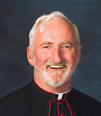 with
Auxiliary Bishop David O'Connell of the San Gabriel Region with
Auxiliary Bishop David O'Connell of the San Gabriel Region2019 (All Souls, Alhambra) |
 with
Los Angeles Archbishop José Gomez with
Los Angeles Archbishop José Gomez2017 (St Francis of Assisi, L.A.) • 2016 (St Mary Magdalen, Camarillo) • 2015 (St Finbar School, Burbank) • 2014 (St Columbkille School, L.A.) • 2013 (St Bernard School, L.A.) • 2012 (St Dorothy School, Glendora) • 2011 (St Thomas School, L.A.) |
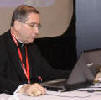 with
Cardinal Roger Mahony, Archbishop Emeritus of Los Angeles with
Cardinal Roger Mahony, Archbishop Emeritus of Los Angeles2010 • 2010 (St John Chrysostom School, Inglewood) • 2009 • 2009 (St Elisabeth, Van Nuys) • 2008 • 2008 (Sacred Heart, Covina) • 2007 • 2007 (St Benedict, Montebello) • 2007 (St Rita, Sierra Madre) • 2006 • 2006 (Holy Innocents, Long Beach) • 2005 • 2004 • 2003 • 2001 • 2001 (St Jerome, Westchester) • 2001 (Holy Family, South Pasadena) • 2000 • 1999 • 1998 • 1997 • 1996 |
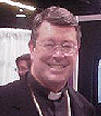 with
Auxiliary Bishop Edward Clark of the Our Lady of the Angels Pastoral
Region with
Auxiliary Bishop Edward Clark of the Our Lady of the Angels Pastoral
Region |
|
2016 Marks 20 Years of
Congress Chats — The first (typing) RECongress chat was held on Friday,
February 23, 1996 on CompuServe with Cardinal Roger Mahony. Ten
years later, on Friday, March 31, 2006, the Cardinal's annual chat
was conducted in a room hosted on ChurchWerks.com. The Cardinal
participated in 22 Congress chats (both nationwide and with schools)
over 14 years. At Congress 2016, Archbishop José Gomez has continued the tradition of (now, video) chats with school students from the Archdiocese. This was his sixth Congress chat (and fourth video chat) conducted from the Tech Center, located in the center of Exhibit Hall A at the Religious Education Congress. The RECongress chat are now continued through the regional bishops, while the Archbishop now holds an event on Facebnook Live. Beginning on CompuServe, the RECongress nationwide chats have been hosted by AOL Live! (1997-2000), Beliefnet (2001), CatholicWeb.com (2002-2003), and ChurchWerks.com (2004-2010). The school chats have been conducted on AOL (2001-2006), Yahoo (2007), Chatzy (2008-2012), Skype (2013-2014) and Google+ (2015-2016). |
|
CONGRESS HOME PAGE |
ABOUT
CONGRESS: Order
Guidebook �
Reviews �
Themes �
Theme Reflections �
Theme Songs �
Sign Up �
Congress Chats �
Resources �
Volunteers �
For New Exhibitors �
Order Recordings �
Download Recordings �
Congress Milestones �
History in Photos �
Email Us �
Contact Us �
Privacy Policy |
|||
| 2020 CONGRESS INFO: REC 2020 � REC LIVE � YOUTH DAY � SPOTLIGHT � SCHEDULE � LITURGIES � SPEAKERS � TOPICS � WORKSHOPS � SPEAKER HANDOUTS � SPEAKER SIGNING � VIEW BOOKS � ENTERTAINMENT � TECH CENTER � TRAVEL � EMAILINGS � UPDATES � HOTELS � EXHIBITORS � EXHIBITOR CATEGORIES � STATISTICS � MEDIA ACCESS | |||
| |||
